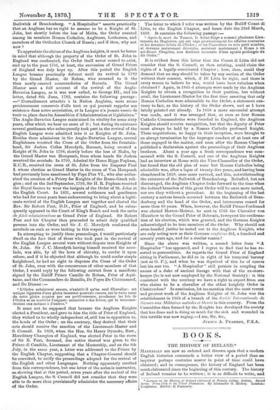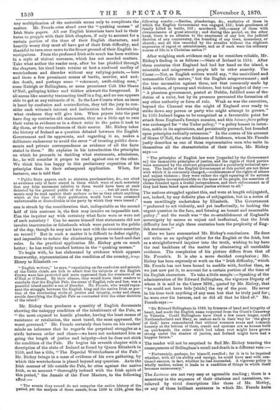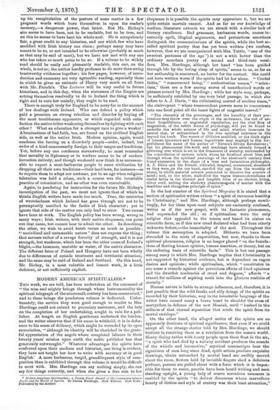BOOKS.
THE HISTORY OF IRELAND.*
MATERIALS are now so ordered and thrown open that a modern English historian commands a better view of a period than an inquirer perhaps centuries nearer in point of time could have obtained ; and in consequence, the history of England has been much elaborated since the beginning of this century. The history of Ireland remains to be written ; it is so difficult to write, and
* Lectures on the History of Ireland (delivered at 7rinity College, Dublin). Second Series. From 1534 to the Ulster Plantation. By Alexander G. Richey. London: Longman& Dublin: E. Ponsonhy.
any multiplication of the materials seems only to complicate the matter. Mr. Froude cries aloud over the "quaking morass" of Irish State papers. All our English historians have had in their turns to grapple with their Irish chapters, if only to account for a certain portion of the time of their English characters, and heartily weary they must all have got of their Irish difficulty, and thankful to turn once more to the firmer ground of their English in- vestigations. From the professed Irish side much has been written in a style of violent unreason, which has not mended matters. Take what author the reader may, after he has plodded through the chapters, his tired brain retains at best a confused medley of wretchedness and disorder without any rallying-points,— here and there a few prominent scenes of battle, murder, and sud- den death, and perhaps some "vehement, swift-riding man," some Raleigh or Bellingham, or some prominent Celt like Shane O'Neil, galloping hither and thither athwart the foreground. It all seems like anarchy transacting itself in a fog, and no one appears able to get at any rationale of it. In the Law Courts when an issue is beset by confusion and contradiction, they tell the jury to con- sider each witness's interest and inclination before determining what credence they will give him. When pryers into the past have dug up centuries-old statements, they are a little apt to rate their value in evidence as in a direct ratio to the pains it took to dig them, or the reconditeness of their source. Mr. Richey takes the history of Ireland as a question debated between the English Government and its opponents, and regarding it so, makes a deliberate endeavour to avoid the error "of treating public docu- ments and private correspondence as evidence of all the facts stated in them." He explains in his introduction the principles on which he proceeds in deciding what statements, admissions, &c., he will consider it proper to read against one or the other.
We think him less happy in this preliminary exposition of his principles than in their subsequent application. When, for instance, one is told that
" Public State papers, such as statutes, proclamations, &c.. are cited as evidence only of facts stated in them which were of such notoriety that any false statement relative to them would have been at once
detected by the general public of the day bnt all such docu- ments may be read against their authors so far as they admit anything which at the time of their publication would have been esteemed unfavourable or discreditable to the party by which they were issued ;"
one is struck by the consideration that, indisputable as the second half of this sentence is, the first may involve an impossible test. Can the inquirer say with certainty what facts were or were not of such notoriety ? Can he assure himself that statements did not involve inaccuracies or falsehoods which were patent to the public of the day, though he may not have met with the counter-assertion on record ? But in such a matter it is difficult to define rigidly, and impossible to reduce the eliminating process to hard-and-fast rules. In the practical application Mr. Richey gets on much better ; he has really touched bottom in the "quaking morass." To begin with, he has elaborated by evidence which appears trustworthy, representations of the condition of the country, temp. Henry to Elizabeth :—
" English writers," he says, "expatiating on the confusion and misrule of the Celtic chiefs, are loth to admit that the subjects of the English Crown were less protected and more oppressed than the retainers of an O'Neil or O'Donel. By their silence, they would leave their readers to conclude that the English Pale, the scene of English rule and law, was a peaceful island amidst a sea of disorder. Mr. Fronde, who would repre- sent the struggle between the English king and the native Irish as por- tion of the everlasting strife of justice sad iniquity, order and chaos, avoids describing the English Pale as contrasted with the other districts of the island."
Mr. Richey then produces a quantity of English documents showing the unhappy condition of the inhabitants of the Pale, as "the moat exposed to hostile plunder, having the least means of resistance or retaliation, the most taxed, the most oppressed, the worst governed." Mr. Fronde certainly does leave on his readers' minds an inference that he regards the perpetual struggles as a strife between order and chaos—we have not understood him as going the length of justice and iniquity—but he does not shirk the condition of the Pale. He begins his seventh chapter with a description of the state of Ireland as found by Queen Elizabeth in 1559, and has a title, "The Especial Wretchedness of the Pale." Mr. Richey brings in a mass of evidence of his own gathering, by 'which this wretchedness is placed beyond any question. As to the Irish manner of life outside the Pale, he cites against the native Irish, as an account "thoroughly imbued with the Irish spirit of this period," the Annals of the Four Masters, to the following effect :—
" The events they record do not comprise the entire history of the period, yet the analysis of these annals, from 1500 to 1534, gives the
following results :—Battles, plunderings, &c., exclusive of those in which the English Government was engaged, 116; Irish gentlemen of family killed in battle, 102 ; murdered, 168,—many of them with circumstances of great atrocity ; and during this period, on the other hand, there is no allusion to the enactment of any law, the judicial decision of any controversy, the founding of any town, monastery, or- church ; and all this recorded by the annalist without the slightest. expression of regret or astonishment, and as if such were the ordinary course of life in a Christian nation !"
After weighing such evidence only as he considers reliable, Mr.. Richey's finding is as follows :—State of Ireland in 1534. After three centuries that England had had her hand on the island, & miserable and misgoverned people left to utter anarchy. The Cause :—Not, as English writers would say, "the uncivilized and- untameable Celtic nature," but the English misgovernment ; and the true accusation against them, not that commonly made by Irish writers, of tyranny and violence, but total neglect of duty :— " A phantom government, posted at Dublin, fulfilled none of the- duties of a ruler, but by its presence prevented the formation of any other authority or form of rule. Weak as was the executive, beyond the Channel was the might of England ever ready to strike down any person or party who might attempt to govern." In 1535 Ireland began to be recognized as a favourable point for attack from England's foreign enemies, and this laissez-faire policy' was exchanged for "the Tudor policy," "a policy honest in inten- tion, noble in its aspirations, and persistently pursued, but founde& upon principles radically erroneous." In the course of his account of Shane O'Neil, the utter Irishman of Irishmen, whom Mr. Fronde- justly describes as one of those representative men who unite in themselves all the characteristics of their nation, Mr. Richey. says:--
" The principles of English law were [regarded by the Governmenb as] the immutable principles of justice, and the rights of third parties were measured by the abstract propositions of a peculiarly technical sys- tem. The faults of the English Government at this period are not those. with which it is commonly charged,—recklessness of the rights of others- and unjust violence ; they were rather the rigid squaring of its actions by principles incomprehensible to the mass of its people, the assertion of. claims founded upon a feudal jurisprudence, and their enforcement as if they had been based upon abstract justice evident to all."
The natives struggled against this, and were at length subjugated,, not, indeed, by any definite plan of subjugation, but in a series of wars unwillingly undertaken by Elizabeth. The Government "preferred to act violently, and yet ineffectually, to looking the- urgent question in the face, and forming an honest and reasonable policy ;" and the result was "the re-establishment of England's sovereignty by means so unjust and ineffectual, that the Irish difficulty has for nigh three centuries been the perplexity of Eng- lish statesmen."
Here we have summarized Mr. Richey's conclusions. He does- not write as an apologist either for the English or the Irish, but as a straightforward inquirer into the truth, wishing to lay bare- the real backbone of the matter by eliminating all unreliable evidence. The complexion of his picture differs from that of Mr. Fronde's. It is also a more decided complexion ; Mr. Richey has been expressly at work on the "Irish difficulty," which. Mr. Froude has not been bound to meddle with, further than, as we just now put it, to account for a certain portion of the time or his English characters. To take a little sample :—Speaking of the administration of Sir Edward Bellingham, the vigorous Deputy of whom it is said in the Carew MSS., quoted by Mr. Richey, that "he could not have bide [abide] the cry of the poor. He never- in his time took anything of any man but that he truly paid for;. he wore ever his harness, and so did all that he liked of." Mr.... Fronde says :— "Sir Edward Bellingham in 1549, by firmness of hand and integrity of heart, had made the English name respected from the Giant's Causeway to Valentia. Could Bellingham have lived a few years longer, could Northumberland and Mary, so zealous each in their way for 'the glory of God,' have remembered that without common sense and common. honesty at the bottom of them, creeds and systems are as houses built on quicksands, the order which had taken root might have grown strong under the shadow of justice, and Ireland might have had a happier future."
The reader will not be surprised to find Mr. Richey treating the consequences of Bellingham's recall and death in a different vein :— " Fortunately, perhaps, for himself, recalled ; for it is to be inquired whether, with all his ability and energy, he could have met with con- tinued success, in fact, whether he had succeeded. A vigorous policy is. wholly useless, unless it leads to a condition of things in which itself becomes unnecessary."
The Lectures are not very easy or agreeable reading ; there is a monotony in the sequence of their citations and narrations, un- relieved by vivid descriptions like those of Mr. Motley, or any of those brilliant sentences in which Mr. Froude knits up his recapitulation of the posture of some matter in a few pregnant words which burn themselves in upon the reader's memory,—a dangerous power, that latter. But Mr. Richey's aim seems to have been, not to be readable, but to be true, and on this he seems to have bent his whole soul. He is scrupulously fair, a great credit to any historian, and one which few who have meddled with Irish history can claim ; perhaps many may have meant to be so, or not intended to be otherwise (probably as much as that may be said of most), but we have not met with any one who has taken so much pains to be so. If a volume to be widely read should be easily and pleasantly readable, this one, on the whole, is not so; the author hardly professes to do more than string trustworthy evidences together ; his few pages, however, of intro- duction and summary are very agreeable reading, especially those in which he gives an estimate of Henry very much on all fours with Mr. Fronde's. The Lectures will be very useful to future historians, and in this day, when the statesmen of the Empire are setting themselves resolvedly to do to Ireland the thing which is right and to cure her malady, they ought to be read.
There is enough truly for England to be sorry for in the account of her dealings with Ireland. Who can defend a policy which paid a premium on strong rebellion and disorder by buying off the most troublesome opponents, or which regarded with satis- faction the native tribes weakening themselves by fighting with each other ? What an education for a stronger race to give a weaker ! Abominations of bad faith, too, are found on the civilized English side, as well as the native Irish. Modern opinion, again, would condemn the forcing on a disorderly people—order, indeed, but order of a kind unnecessarily foreign to their usages and traditions. Yet, before any one condemns unreservedly, he must remember that morality in diplomacy or in warfare seems to be of modern invention entirely, and though we should now think it as unreason- able to expect a semi-barbarous people to enter civilization by dropping all their own traditions—their land laws, for instance—as to require them to adopt our costume, yet in an age when religious toleration was held a crime, such a course was the invariable practice of colonization, and no other was even conceivable.
Again, in pondering for instruction for the future Mr. Richey's investigation of the past, we must not ignore that of which he thinks English writers have made too much. True, the centuries of wretchedness which Ireland has gone through are not to be peremptorily ascribed to the faults of Irish character ; yet to ignore that side of the matter can only lead to error. Two causes have been at work. The English policy has been wrong, wrong in many ways ; Irish writers, with their native eloquence, can point out that cause, but cannot bear to admit the other. In describing the other, we wish to avoid harsh terms as much as possible ; "uncivilized and untameable nature" does not express the thing ; that savours rather of a savage ferocity of strength, and it is not strength, but weakness, which has been the other cause of Ireland's blight,—the looseness, unstable as water, of the native character. The different fates of Poland and Hungary have not been wholly due to differences of outside treatment and territorial situation, and the same may be said of Ireland and Scotland. On this head, Mr. Richey, in a most valuable and honest work, is a little deficient, or not sufficiently explicit.




































 Previous page
Previous page